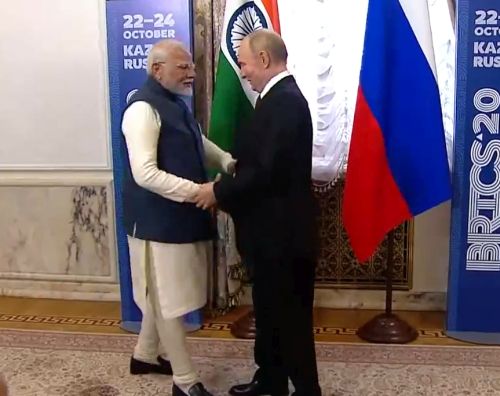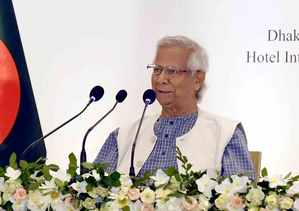International
IANS Analysis: Pak's perilous path – Counter-terror strategy and strain on Afghan relations
New Delhi, July 10 (IANS) The persistent threats by high-ranking Pakistani officials and ministers to target terrorist groups inside Afghanistan have raised the spectre of further destabilisation in the region.
For a country that has struggled to contain the menace of terrorism within its borders, Pakistan’s military-dominated establishment often obfuscates its shortcomings by blaming the Afghan Taliban and accusing it of providing sanctuary to terrorist groups targeting Pakistan.
With this convenient scapegoating failing to address the root causes of Pakistan’s internal security woes, these threats mark a significant escalation in Islamabad’s approach to dealing with terrorism, actions that will most likely further strain the already fragile relations between Islamabad and Kabul.
With an exponential surge in terrorist violence in the country, Pakistan’s federal government, under pressure from China, whose five nationals were killed in one such incident on March 26, announced its latest counterterrorism operation, Azm-i-Istehkam, or Strong Resolve for Stability, on June 22.
A press release from the Pakistan’s Prime Minister’s Office (PMO), affirmed that this “reinvigorated and re-energised” military campaign “will integrate and synergise multiple lines of effort to combat the menaces of extremism and terrorism in a comprehensive and decisive manner”.
This was followed by Defence Minister Khwaja Asif’s declaration of June 27 emphasising in no uncertain terms that Islamabad would not hesitate targeting terrorist groups inside Afghanistan as part of this counterterrorism push.
Operation Azm-i-Istehkam is the latest in a series of military campaigns by the Pakistani state to root out terrorism from the country.
In 2014, Pakistan launched its first large-scale counterterrorism operation, Zarb-e-Azb, or Sword of Prophet Muhammad, against various extremist groups such as Tehreek-e-Taliban Pakistan (TTP) in its North Waziristan region. While it displaced nearly a million people and led to hundreds of civilian deaths, Pakistan claimed to have succeeded in dismantling the terror ecosystem and eliminating over 3,500 terrorists.
Despite these claims, the operation failed to address the root causes of extremism in the country, allowing the TTP and other groups to regain strength swiftly and engage in anti-state violence.
Following Zarb-e-Azb, the Pakistan Army initiated Operation Radd-ul-Fasaad, or Rejection of Strife, to consolidate its gains. However, the recurrent terrorist attacks indicated that the campaign did little to dismantle the terror ecosystem in the country, allowing the terrorists to operate with relative impunity.
The problem with these operations has been their unilateral militaristic approaches to the issues that demand multipronged engagement, something Pakistani authorities seem unwilling to adopt.
The Pakistani government’s strategy took a more complex turn in August 2021, when it supported the Afghan Taliban in ousting the Republican Government of Afghanistan to establish an Islamic Emirate.
The belief was that a friendly regime in Kabul would help contain terrorism away from Pakistan’s borders while providing it a strategic depth to counter regional powers like India and Iran. This expectation, however, proved to be very short-lived and highly delusional as it did not bring any security dividend to Pakistan. Instead, it appears to have further contributed to Pakistan’s internal security vows.
The Afghan Taliban, sharing ideological ties with the TTP, have little incentive to act against their ideological brothers and credible allies who had fought alongside them against American forces. As such, it has disregarded Islamabad’s calls for undertaking military action against TTP, especially after the breakdown of a ceasefire between the Pakistan Army and TTP in November 2022.
Ever since, Pakistan has witnessed an exponential surge in terrorist attacks resulting in over 2,300 deaths of Pakistani security forces, as claimed by the country’s federal government.
Ever since, Pakistan has repeatedly blamed the Afghan Taliban for providing safe sanctuary to TTP militants, asserting that these groups “have consistently used Afghan territory to launch terror attacks inside Pakistani territory”, accusations that Kabul has repeatedly denied.
Interestingly, the Afghan Taliban has accused Pakistan’s spy agency, Inter-Services Intelligence (ISI), of patronising Islamic State Khorasan (ISK), a group which has emerged as the biggest security challenge for the Afghan government and conducted dozens of terrorist attacks inside Afghanistan.
With an unprecedented surge in terrorist attacks in March 2024 wherein seven Pakistani soldiers were killed, including a Lieutenant Colonel and a Captain rank officer, Islamabad went on to conduct cross-border air strikes inside Afghanistan on March 18, 2024, demonstrating the level of distrust between Kabul and Islamabad. The Pakistan authorities claimed to have killed eight terrorists in the Paktika and Khost provinces along the Pakistan border in its air strikes.
Afghan Taliban in response condemned the air strikes as an outright “violation of Afghani territory”, warning Islamabad that such transgressions could “lead to dire consequences which will not be in control of Pakistan”, even as it mobilised its forces along the Durand Line.
Nevertheless, Kabul has consistently denied its support for the Pakistan Taliban. It has reasoned that instead of blaming Afghanistan for its “failure to control violent incidents”, it would better serve Islamabad to look inwards and address its internal fissures than pointing fingers at others.
As such, Pakistan’s threats to repeat such actions not only risk violating international norms but could also ignite a broader conflict in an already volatile region.
The potential for cross-border counterterrorism operations raises several critical questions. First and foremost, can Pakistan achieve its security objectives without further destabilizing the region? The answer is uncertain. While targeting militant groups in Afghanistan may yield short-term gains, it will likely provoke retaliatory attacks and deepen the cycle of violence as has been demonstrated by its earlier military campaigns.
It seems that Pakistani authorities in its bid to appease China, on whose behest Operation Azm-i-Istehkam is being conducted, are unwilling to address the root cause of instability in the country.
Moreover, the projection of the ghost of external threat is an obfuscation of the failure of Pakistani security forces which have for years engaged in counter-terrorism measures and yet not succeeded in ending this menace from the country. It is highly unlikely that the Afghan government will view any such incursions and Islamabad’s constant badgering with kindness amidst its own security predicaments.
Therefore, as Pakistan initiates yet another military campaign, it should remember that any cross-border misadventure in Afghanistan is fraught with risks that could further destabilise an already fragile region.
Shehbaz Sharif’s government would do Pakistan a favour by refraining from such hawkish measures and understanding that the path to the country’s lasting security and stability lies not in military transgressions but holistically addressing the root cause of terrorism in the country which has socio-economic grievances at the core. It must tread carefully, lest it finds itself embroiled in a conflict that it cannot control.
–IANS
scor/sha
International
Lee Hsien Yang seeks refuge in United Kingdom

Lee Hsien Yang, the youngest son of Singapore’s founding father, the late Lee Kuan Yew, announced on Tuesday that he is now a political refugee in the United Kingdom after seeking asylum from the British government “as a last resort.”
“I remain a Singapore citizen and hope that someday it will be safe to return home,” Lee stated in a Facebook post, as reported by Channel News Asia (CNA).
Citing what he described as the Singapore government’s “attacks” against him, Lee, who is the younger brother of former Prime Minister Lee Hsien Loong, revealed that he sought asylum protection in 2022.
Lee Hsien Yang and his late sister, Lee Wei Ling, who passed away earlier this month, have been in conflict with their brother Lee Hsien Loong over the fate of their father’s home following his death in 2015, resulting in a public dispute that has estranged the siblings.
In an interview with the UK-based newspaper The Guardian, Lee alleged that a “campaign of persecution” compelled him to seek asylum in Britain.
In response to his claims, the Singapore government stated that there is “no basis” for his allegations of “a campaign of persecution” or other assertions regarding political repression in the country.
“Singapore’s judiciary is impartial and makes decisions independently. This is why Singaporeans have a high level of trust in the judiciary,” a government spokesperson remarked.
The spokesperson added that there are no legal restrictions preventing Lee and his wife, lawyer Lee Suet Fern, from returning to Singapore. “They are and have always been free to return to Singapore,” the spokesperson said.
Lee and his wife have been outside of Singapore since 2022, having opted not to attend a scheduled police interview regarding potential offenses related to providing false evidence in judicial proceedings concerning their father’s will and the family home.
Lee and his late sister, who had been living at the property, alleged they felt threatened while trying to fulfill their father’s wish to demolish the house. They also accused their elder brother, former Prime Minister Lee Hsien Loong, of abusing his governmental influence to advance his personal agenda.
International
Indo-Russian ties are stronger than ever before at BRICS

Kazan, Russia: Prime Minister Narendra Modi held a bilateral meeting with Russian President Vladimir Putin on the sidelines of the 16th BRICS Summit.
During the meeting, President Putin remarked, “I recall our meeting in July, where we had productive discussions on various issues. We’ve also spoken over the phone several times. I am very grateful you accepted the invitation to come to Kazan. Today, we will attend the BRICS Summit’s opening ceremony, followed by dinner.”
PM Modi responded by expressing his appreciation, saying, “I sincerely thank you for your friendship, warm welcome, and hospitality. It’s a great pleasure to visit such a beautiful city as Kazan for the BRICS Summit. India shares deep historical ties with this city, and the opening of our new embassy here will further strengthen these connections.”
International
Laos seeks to enhance nutrition amid climate change concerns

Vientiane (Laos), Aug 22 (IANS) Representatives from the Lao government and development partners have attended a conference here titled “Climate Change and Nutrition in Laos: Intersections and Interventions” to discuss the impact of climate change on nutrition in the Southeast Asia country and potential solutions.
Speaking at the conference, deputy director general of the Department of Hygiene and Health Promotion under the Lao Ministry of Health Viengkhan Phixay, said, “We gather to address a critical and interwoven issue: the impact of climate change on nutrition and how we can work together to tackle these challenges,” Xinhua news agency reported.
The Lao government is actively engaged in this endeavor, with numerous policies and initiatives aimed at addressing both climate change and nutrition, Lao National Television reported on Thursday.
“By leveraging the Scaling Up Nutrition network in Laos, which is led by the government, and supported by civil society, donors, and the United Nations, we have a robust platform to tackle the negative impacts of climate change while improving nutrition and overall health for everyone in Laos,” Viengkham said at the conference held on Monday.
The conference featured a series of presentations that not only detailed evidence-based research but also introduced innovative tools for measuring and enhancing nutrition under the impact of climate change.
The conference stressed the critical need for integrated approaches to tackle the intertwined challenges of climate change and nutrition, and setting the stage for impactful future collaborations.
–IANS
int/psd
International
One killed, seven injured in shootout in Iraq

Baghdad, Aug 22 (IANS) A civilian was killed while seven others were injured on Thursday in a tribal shootout in Iraq’s holy Shiite province of Najaf, according to a local security source.
The shootout erupted in the early hours between armed men from the local tribe in the al-Zarga area in northern Najaf, some 160 km south of Baghdad, a local police officer told Xinhua on condition of anonymity.
The clash resulted in the killing of an Iraqi civilian and the injury of seven others, including three Iranian Shiite pilgrims, the source added.
A joint force from the Interior Ministry’s emergency response division and Najaf provincial police arrested 53 gunmen from both sides of the shootout and seized weapons and ammunition, the Interior Ministry said in a statement.
It added that search operations are ongoing to locate additional gunmen and weapons, with more details to be released later.
The incident took place as numerous pilgrims traveled to the city of Karbala to observe Arbaeen, which marks the end of a 40-day mourning period for the killing of Imam Hussein, the grandson of Prophet Muhammad, in the Battle of Karbala in 680 A.D.
Typically, these pilgrims also visit Najaf as part of their journey to Karbala.
–IANS
int/jk/arm
International
Bangladesh seeks $1 billion budget support from World Bank

Dhaka, Aug 22 (IANS) Bangladesh’s interim government has sought $1 billion from the World Bank as budgetary support.
The call came from the country’s Power, Energy and Mineral Resources Adviser Muhammad Fouzul Kabir Khan’s meeting with Abdoulaye Seck, the World Bank’s Country Director for Bangladesh and Bhutan, in Dhaka on Wednesday.
He made the plea as the ministry owes more than 2 billion dollars to suppliers in import costs of power and energy, Xinhua news agency reported.
Khan mentioned that the interim government, which was formed with many pressing mandates, is due to settle a $2 billion debt left by the previous government in the power sector.
He said they have already suspended activities under the much-criticized Quick Enhancement of Electricity and Energy Supply Act 2010 and abolished the government’s power to set energy prices without any public hearing.
On August 5, the former Prime Minister of Bangladesh, Sheikh Hasina, was ousted from her country and power, ending her rule since January 2009.
This event was seen as a massive escalation, with what initially started as student’s protests and resulted in a major crisis in Bangladesh.
Earlier on August 8, Nobel laureate Muhammad Yunus took oath as the head of Bangladesh’s interim government.
–IANS
int/jk/as
-
Video2 years ago
PM Modi Attacks Congress in Karnataka with “Kerala Story”
-
Politics2 years ago
Siddaramaiah & DK Shivakumar sworn in as Chief Minister & Deputy CM respectively
-
Cricket2 years ago
CSK players rejoice 5th IPL title with their families (Pics)
-
Entertainment2 years ago
Karan Deol weds his longtime Girlfriend Drisha Acharya (Pics)
-
Sports7 years ago
History Of Official FIFA WORLD CUP Match balls
-
India2 years ago
Ashwini Vaishnaw: Railway Board recommends CBI probe in the Odisha railway disaster
-
Entertainment2 years ago
Urvashi Rautela dazzles on Cannes 2023 red carpet (Pics)
-
Entertainment2 years ago
Sunny Leone gets ready for Kennedy premiere in Cannes (Pics)






























